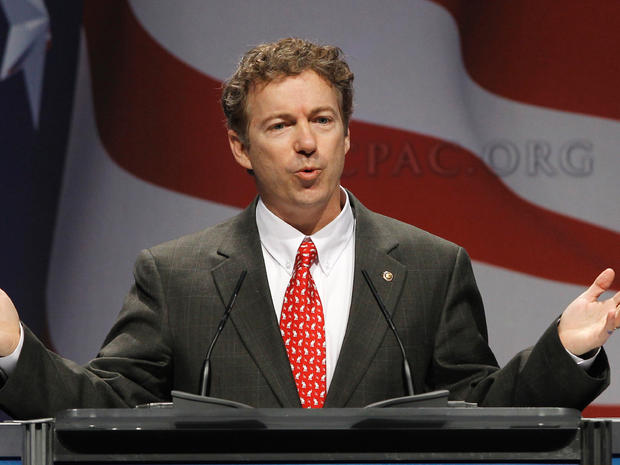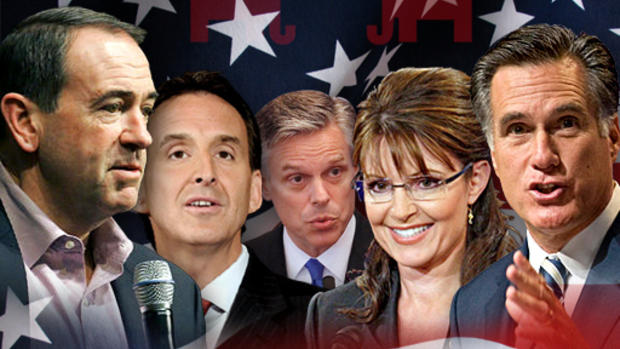Rand Paul on How Not to Be Co-opted by Washington
WASHINGTON -- Following his speech at the Conservative Political Action Conference Thursday, Kentucky Sen. Rand Paul - the Tea Party-backed, Libertarian-leaning Republican pushing for drastic cuts to balance the budget - answered a few questions from Hotsheet about how to keep from being coopted by Washington and his proposal to cut the defense budget.
"Because I've been fairly outspoken during my campaign and here, I think I'll get less pressure from special interests," he said when asked if he'd yet see the dark side of Washington. He talked about how a president of a university whose "job is to advocate for money" said he realizes the country has to come before his earmark needs.
"So I think people understand that and are willing to work through what it's going to take," he said. "I think you have to realize the alternative. Everybody always wants to talk about 'oh, are you going to cut this.' The alternative may be chaos if we don't get our debt under control."
Paul then addressed whether he can be reelected if he spurns the special interests that spend lavishly to fund political campaigns.
The 2012 GOP Presidential Field: Strengths and Weaknesses for the Top Contenders
"I think the interesting thing is that it may be the opposite of conventional wisdom," he said. "Conventional wisdom is you have to pass out as much money as you can to as many special interests as you can, get their PAC money, run your campaign, you win. But [that] may be wrong."
He continued: "Look at [New Jersey governor] Chris Christie. He's bold and outspoken and challenges people and I think he still seems to be popular - he hasn't had an election yet. But I think we'll find out. My prediction is, one, I believe in it, but two, I think you can actually tell the truth and get more votes. I think you can be bold and get more votes."
Paul also addressed his proposal to cut military spending - something that elicited a number of boos from the CPAC audience of conservative activists when he brought it up during his speech.
"I think you can do it and still have a strong national defense," he said. "I think you can still protect a country against terrorists by having more small and mobile forces that can protect us and stop terrorism from occurring. I think large, land-scale wars are maybe not the best way to approach terrorism."
He noted that there are 100,000 American troops in Afghanistan compared to less than 100 members of Al Qaeda. He said under that ratio, there would have been about 50 million U.S. soldiers abroad during World War II.
"No one would have understood that ratio," he said. "So I think you can have many less soldiers in Afghanistan and still control Afghanistan."
Donald Trump: Ron Paul Can't Win
NRA's Wayne LaPierre: "Government Policies Are Getting us Killed"
Santorum Blasts Obama for Siding with Egyptian Protesters
Newt Gingrich: Replace the EPA
Michele Bachmann: China's Hu is "Your Daddy"
Read All of Hotsheet's Reports from CPAC
Paul declined to address repeated questions about whether America should close its bases in places like South Korea and Germany. He said his proposal is to cut six percent from the 2010 military budget. Pressed on that sounding like a relatively small percentage, he said, "it's six percent of a very large number."
"Military expenditures are like over $700 billion," said Paul. "...it's still a significant amount. It's also significant in the sense that we haven't gotten any conservatives to sign onto it yet. And it ultimately is the compromise. Conservatives have to decide that there is some waste in the military budget, and they also have to decide practically that you can't balance the budget by looking at this much [he holds his fingers up slightly apart] of the budget."
Are his colleagues afraid being accused of being soft on terror?
"Everybody is," Paul said. "Because people will sometimes distort things and call you unpatriotic and say you don't care about your country. But I think national defense is the most important thing we do here. But I don't think that means that every dollar is sacred."
Brian Montopoli is a senior political reporter for CBSNews.com. You can read more of his posts here.

